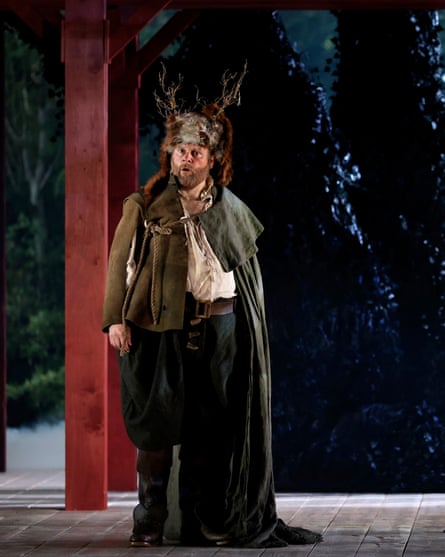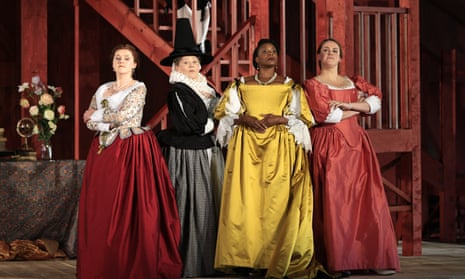Scottish Opera’s staging of La Bohème in its production studios car park was an artistic highlight in the doldrums of last year’s lockdown. Its successor – a new production of Verdi’s Falstaff by Sir David McVicar – is at once more ambitious and more conventional. Gone is the shipping container set and in its place a proper staging, reflecting the fact that the production will also be staged indoors at the Edinburgh international festival next month.
McVicar’s setting for Verdi’s Shakespearean comedy is also Shakespeare’s world. His economical set is an Elizabethan theatre stage, a simple wooden structure with stairs and a gallery above with the action moving between the two levels. The sumptuous costumes, made by Lorna Price, are similarly of the era, all buckled shoes, shimmering fabrics and jewel tones. As a backdrop the wooded thicket that adjoins Scottish Opera’s studio comes into its own, particularly as the setting for the final scene in Windsor Park.

Donning the splendid prosthetic belly of the title role is Roland Wood, who has been something of a Scottish Opera stalwart in recent years. His Falstaff, while undeniably larger than life, is more than just caricature. For all the comedy, there is also pathos, the sense of a man who knows his days of glory are past, but too vain to fully accept present reality.
Falstaff is above all an ensemble comedy and Scottish Opera has assembled a cast to do it justice; Elizabeth Llewellyn (Alice Ford), Sioned Gwen Davies (Meg Page) and Louise Winter (Mistress Quickly) the trio of sharp-witted women who outwit the rather slower men, Phillip Rhodes’s Ford and Aled Hall’s Dr Caius. Verdi’s late-flowering comedy is also a triumph of young love over experience, and here Gemma Summerfield and Elgan Llyr Thomas give a particularly glowing account of the young lovers Nannetta and Fenton. McVicar has some fun with the drunken rustics, Pistol (Alastair Miles) and particularly Jamie MacDougall’s gleefully Scottish Bardolph.
In an outdoor setting production logistics are complex. Scottish Opera’s orchestra is situated in the production hangar to the side of the stage, the sound brought to cast and audience via amplification, the singers similarly amplified for the audience. On the opening night ensemble and particularly balance were problematic at times. Yet whatever the challenges conductor Stuart Stratford never allowed the quicksilver energy of the music to falter, with the notoriously tricky fugal finale – the stumbling block of many a performance – a particular triumph.
Performances in Glasgow until 17 July, then at Edinburgh Festival theatre from 8–14 August.

Comments (…)
Sign in or create your Guardian account to join the discussion